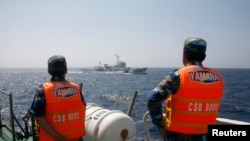China has renamed scores of islets and underwater landforms in the South China Sea, a move some analysts say is intended to push back against Vietnamese naval incursions in the disputed waterway.
Two Chinese government ministries have renamed 25 islets and 55 submerged features in the South China Sea that stretches from Hong Kong to Borneo, the country's Civil Affairs Ministry said on its website April 19.
This act, though it doesn't automatically give China more legal sovereignty than five other Asian governments with claims to the resource-rich sea, helps repel Vietnam after a string of upsets that culminated in February, analysts believe.
That month, 311 Vietnamese vessels "intruded" into internal waters, territorial seas, and exclusive economic zones of three southern Chinese provinces, a Peking University monitoring service said. China was trying then to control the world's first coronavirus outbreak in Hubei province and reported recovery in March.
"The Chinese have perceived the Vietnamese exploiting their vulnerability and the inability to react to them during COVID-19, so now that the Chinese are back online there's a sense that 'we need to punish Vietnam for this,'" said Yun Sun, East Asia Program senior associate at the Stimson Center, a research center in Washington.
China renamed the features for the first time since 1983 to "further standardize the use of geographical names," the Civil Affairs Ministry said. Chinese-language names were established in the 1940s after World War II to replace English-language ones that appear on international maps.
The new names, all in Chinese, reflect topographic changes due to rising sea levels and exploration for undersea oil and natural gas, said Huang Chung-ting, an assistant research fellow with the Institute for National Defense and Security Research in Taipei. The names cover the Spratly and Paracel archipelagos, both claimed all or in part by Vietnam.
Brunei, Malaysia, the Philippines and Taiwan contest Chinese claims to the 3.5 million-square-kilometer sea as well, but they openly challenge China less often than Vietnam does.
China has taken a military and technological lead over the others in the past decade to back its claims to about 90% of the waterway. Its expansion has prompted condemnations from Washington, sparked periodic incidents at sea and generated years of searching for a diplomatic solution.
Vietnam and China became locked in a vessel standoff last year near a Vietnamese drilling tract. In 2014, boats from the two sides rammed each other over the placement of a Chinese oil rig. Vietnam, as chair of the 10-nation regional bloc Association of Southeast Asian Nations, and as the current rotational president of the U.N. Security Council, has a platform this year to bring up China's maritime expansion, Huang said.
"Even without this matter, they would definitely use the chair position's special rights of discussion to give themselves a better channel to speak out on the South China Sea," he said. "With this matter now, I believe Vietnam will take some actions to strike back."
The renamed features are especially close to Vietnam, he added.
Vietnam might go as far as the world arbitration court against China, Sun said. Arbitral rulings aren't binding – China ignored a 2016 ruling against the legal basis for its maritime claims. But a new court case would be "politically significant" and could erode relations between Communist parties that have patched over other disputes, Sun said.
China's renaming of the atolls, seamounts and ridges would add pressure on Vietnam following passage of a Chinese survey vessel through Vietnamese-claimed waters in mid-April, analysts believe.
China cites historical usage records to back its maritime claims. Its leaders "desperately need a win" diplomatically to boost morale among Chinese after the disease outbreak, Sun said.
Renaming islets boosts China's position in any negotiations with the 10-member Southeast Asian bloc, Huang said. That action shores up China's evidence of civilian exercise in the disputed sea, which could have "legal impact" later if other claimants fail to protest, said Jay Batongbacal, international maritime affairs professor at University of the Philippines.
"It's all part of that grand plan of theirs to exercise civilian authority, civilian administration over all parts of the South China Sea that they claim," Batongbacal said. "It's like they're trying to build up the evidence. They look like little things. They may be ineffectual in a real sense, but it can have legal impact in the future."




